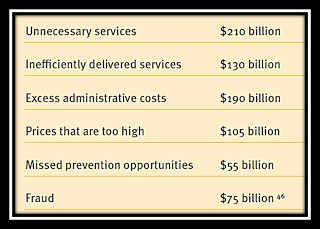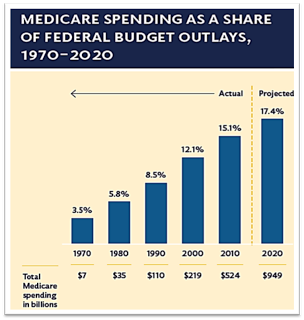Health News
The U.S. spends nearly $3 trillion a year on health care, and that level of spending is unsustainable. The report says that as a proportion of the federal budget, the cost of Medicare has risen from 3.5 percent in 1975 to 15.1 percent in 2010 in 2010). In 2020, it is projected to consume 17 percent, or 4 percent of the U.S. gross domestic product.
Recognizing the way that physicians are paid contributes substantially to the high cost of health care, The Society of General Internal Medicine convened the commission in March 2012 to make recommendations for payment reform. According to the report, some of the factors that drive up health care expenditures are:
 The commission says increased taxes are not needed to fix the Medicare problem, and the Medicaid shortfall could be entirely found by reducing overuse of services within Medicare. See the chart to the right for a breakdown of those excess medical costs.
The commission says increased taxes are not needed to fix the Medicare problem, and the Medicaid shortfall could be entirely found by reducing overuse of services within Medicare. See the chart to the right for a breakdown of those excess medical costs.
The commission developed 12 recommendations to reduce health costs, calling for drastic changes to the current fee-for-service payment system and a five-year transition to a physician payment system that rewards quality and value-based care and not the volume of care.
The 12 recommendations were based on the principles that payment reform should improve care quality and efficiency, encourage care for the medically disadvantaged, reduce marginal and ineffective services, increase transparency to the public and should reward patient-centered comprehensive care. (Click here to see those recommendations)
- Kentucky Hospitals Say They're Losing Money On Obamacare, As Cost Of Treating New Medicaid Patients Exceeds Reimbursements
By Melissa Patrick Kentucky Health News Kentucky hospitals are struggling financially because of the billions of dollars in cuts caused by the implementation of the Patient Protection and Affordable Care Act, and many aren't sure they will survive,...
- Medicare Starts To Overhaul The Way It Pays Providers, Rewarding Them For Quality, Penalizing Them For Shortcomings
By Molly Burchett Kentucky Health News The Obama administration on Monday set a timeline for historic changes in how it pays doctors, hospitals and other health providers under Medicare, shifting away from the program's traditional fee-for-service...
- Survey Finds That 93 Percent Of Hospital Executives Think Obamacare Will Improve Systems And Save Costs
While there has been much grumbling about federal health reform, at least one very affected group of people think it's a great idea. A survey by Health Affairs found that 93 percent of hospital executives believe the Patient Protection and Affordable...
- Pat Boone Commercial About Medicare Has Many Inaccuracies
A television commerical misleads seniors into believing the federal health-care reform law will ration and deny care and contains other inaccuracies, according to FactCheck.org, a non-partisan, non-profit service based at the University of Pennsylvania....
- Choose Wisely, Illinois: Alternatives For Balancing The Medicaid Budget
On Thursday, April 19, 2012, the Governor released a proposal for the reduction of the current $2.7 billion Medicaid budget deficit. The proposal, developed with a group of legislators on the Medicaid Commission, includes $2 billion in cuts to eligibility...
Health News
Commission says drastic changes to doctor pay and cuts to wasteful services can fix Medicare problem without tax hikes
A national advisory panel says ?drastic changes? in how Medicare reimburses doctors and other providers are needed to shore up Medicare's finances, improve patient outcomes and rein in health care costs, and there is no need to seek more taxpayer money.
Medicare needs $138 billion over the next decade to avoid steep cuts in physician pay, and avoiding those cuts has become an annual scramble in Congress known as "the doc fix." A panel dominated by internal-medicine specialists, The National Commission on Physician Payment Reform, has concluded that reduction of wasteful medical services can help solve the problem and "our nation cannot control runaway medical spending without fundamentally changing how physicians are paid," it says in its report.
Medicare needs $138 billion over the next decade to avoid steep cuts in physician pay, and avoiding those cuts has become an annual scramble in Congress known as "the doc fix." A panel dominated by internal-medicine specialists, The National Commission on Physician Payment Reform, has concluded that reduction of wasteful medical services can help solve the problem and "our nation cannot control runaway medical spending without fundamentally changing how physicians are paid," it says in its report.
 |
Source: Henry J. Kaiser Family Foundation and Congressional Budget Office, Budget and Economic Outlook, January 2011 |
The U.S. spends nearly $3 trillion a year on health care, and that level of spending is unsustainable. The report says that as a proportion of the federal budget, the cost of Medicare has risen from 3.5 percent in 1975 to 15.1 percent in 2010 in 2010). In 2020, it is projected to consume 17 percent, or 4 percent of the U.S. gross domestic product.
Recognizing the way that physicians are paid contributes substantially to the high cost of health care, The Society of General Internal Medicine convened the commission in March 2012 to make recommendations for payment reform. According to the report, some of the factors that drive up health care expenditures are:
- Fee-for-service reimbursement
- Consolidation in the health-care industry
- Reliance on technology and expensive care
- Reliance on a high proportion of specialists
- Paying more for the same service or procedure when done in a hospital setting as opposed to an outpatient setting
- A disproportionate percentage of health care spending directed to a small number of people who are very sick and costly to treat
- High administrative costs
- Fear of malpractice lawsuits
- Fraud and abuse

The commission developed 12 recommendations to reduce health costs, calling for drastic changes to the current fee-for-service payment system and a five-year transition to a physician payment system that rewards quality and value-based care and not the volume of care.
The 12 recommendations were based on the principles that payment reform should improve care quality and efficiency, encourage care for the medically disadvantaged, reduce marginal and ineffective services, increase transparency to the public and should reward patient-centered comprehensive care. (Click here to see those recommendations)
- Kentucky Hospitals Say They're Losing Money On Obamacare, As Cost Of Treating New Medicaid Patients Exceeds Reimbursements
By Melissa Patrick Kentucky Health News Kentucky hospitals are struggling financially because of the billions of dollars in cuts caused by the implementation of the Patient Protection and Affordable Care Act, and many aren't sure they will survive,...
- Medicare Starts To Overhaul The Way It Pays Providers, Rewarding Them For Quality, Penalizing Them For Shortcomings
By Molly Burchett Kentucky Health News The Obama administration on Monday set a timeline for historic changes in how it pays doctors, hospitals and other health providers under Medicare, shifting away from the program's traditional fee-for-service...
- Survey Finds That 93 Percent Of Hospital Executives Think Obamacare Will Improve Systems And Save Costs
While there has been much grumbling about federal health reform, at least one very affected group of people think it's a great idea. A survey by Health Affairs found that 93 percent of hospital executives believe the Patient Protection and Affordable...
- Pat Boone Commercial About Medicare Has Many Inaccuracies
A television commerical misleads seniors into believing the federal health-care reform law will ration and deny care and contains other inaccuracies, according to FactCheck.org, a non-partisan, non-profit service based at the University of Pennsylvania....
- Choose Wisely, Illinois: Alternatives For Balancing The Medicaid Budget
On Thursday, April 19, 2012, the Governor released a proposal for the reduction of the current $2.7 billion Medicaid budget deficit. The proposal, developed with a group of legislators on the Medicaid Commission, includes $2 billion in cuts to eligibility...
